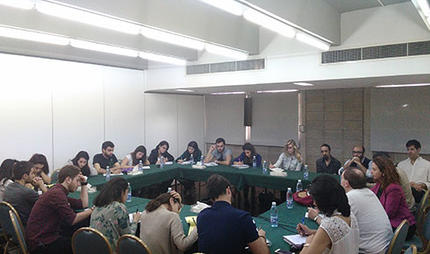Is the Middle East shifting paradigms?
Lebanese and international experts at LAU debate the effect of the Arab Spring on scholars’ understanding of the region.

The presentations were warmly welcomed by the audience and sparked an intense conversation about regional realities.
According to James Worrall, a lecturer of international relations (IR) at the University of Leeds, “international relations theories by themselves are not useful for understanding dynamics in the Middle East.” Addressing a conference room of LAU students and professors, he continued, “this is because IR scholars usually have no real knowledge of the regions they try to apply theories to.” On the other hand, specialists on the Middle East often have no conception of global dynamics, since they focus narrowly on country-specific issues. “A dialogue between IR and Middle Eastern studies” would resolve these dilemmas, Worrall believes.
Worrall presented his findings at LAU on April 11, at a roundtable co-hosted by the Department of Social Sciences and Institute for Social Justice and Conflict titled “Debating the Post-2011 Middle East: Old or New Paradigms?” The event – which brought LAU students and faculty together with international experts Worrall and Alam Saleh, a lecturer in Middle Eastern Studies at the Institute of Arab and Islamic Studies, University of Exeter – took place on the Byblos campus.
“At the onset of the 2011 revolutions, Middle East scholars questioned previous paradigms adopted to study the Middle East,” said panel moderator and LAU Assistant Professor of Political Science and International Relations Tamirace Fakhoury. Five years after the dawn of the Arab Spring, the scholarly community is still struggling to make sense of events in the region.
“Why did we fail to predict the Arab Spring?” asked Worrall. “It was because we focused on the strengths of the regimes, not on their weaknesses.” In his view, there should be three levels of analysis. “The first is global, since the Middle East is the crossroads of the world and will always be contested … the second is interregional, and the third is individual, looking at the dynamics within different countries.”
Saleh’s presentation expanded upon Worrall’s insights from several angles. “International relations theories only look at interstate issues, ignoring the domestic make-up of states,” he said. “On the other hand, critical approaches ignore the state, focusing too much on society.” At the end of the day, this means that scholars fail to explain the region.
Saleh’s solution is to look at the contemporary Middle East through different areas of potential conflict: divisions between social classes, societal identities, between the people and the state, within the political systems, within the region, and between international Great Powers with interests in the Middle East (specifically, Russia and the United States). “This context resists any single theory to explain what is going on,” Saleh insisted.
The presentations were warmly welcomed by the audience and sparked an intense conversation about regional realities. The debate ran a gamut of issues: whether the Middle East should be seen as an “exceptional” place that does not conform to standard scholarly attempts to understand politics and society; the effects of the Syrian conflict on Lebanon; the notion of democracy in the Middle Eastern context; and the role of Islamism in regional politics.
More
Latest Stories
- LAU Engages High Schoolers With Creative Expression and Scholarship Awards
- How Does Digital Media Impact Our Brain?
- Community Development Takes Root at Capstone Presentation Day
- LAU Athletes Return Victorious from Athens and Belgrade
- A New Initiative Toward Harnessing Digital Transformation
- A Cardiovascular Conference to Streamline National Expertise
- Aspiring Engineers Compete for Scholarships at LAU
- The School of Engineering Delivers Immersive Learning Experiences

